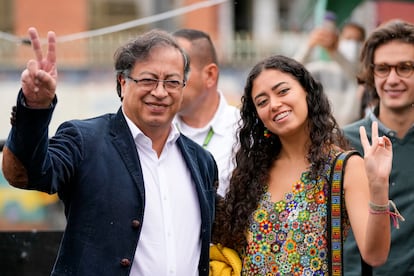Good morning!,
In Colombia, the radio sets the agenda, life is usually organized at its own pace and many citizens wait hours to communicate with the radio stations and give their opinion for a few seconds. One of them called La W radio on Tuesday and raised an issue that has gone unnoticed amid scandals and fights: if the new president of Panama insists on “closing the Darien” as he has announced, this will mean a major social problem for Colombia, said the listener. The country will be the funnel for thousands of migrants who cross the jungle that separates both countries.
Indeed, last week President Gustavo Petro was in Panama and that was one of the issues he discussed with his counterpart José Raúl Mulino. Although diluted in diplomatic language, the Colombian Foreign Ministry reported that “a roadmap was agreed upon that involves, first of all, “generating good conditions in Darién.” It is not clear what that means for a problem that has grown rapidly in recent years and that also includes Colombian migrants. In the first half of 2024 alone, 189,900 migrants have crossed the Darién jungle, of which 122,616 are Venezuelan, followed by Ecuadorians and Colombians, among many other nationalities.
The Panamanian president, who promotes a heavy hand, campaigned by talking about “closing the Darien,” something physically impossible because it is a jungle of 17 thousand square kilometers. He was referring to cutting off the passage and generating repatriations. Precisely this Monday, the government of Panama signed an agreement with the United States to “close the passage” of immigrants whom it calls illegal, although they are irregular. The American government will cover the costs of repatriating the migrants, while Panama will be responsible for providing “equipment, transportation and logistics for detected foreigners.”
There are still no details on how this will be done in practice or whether this will continue or be strengthened depending on who wins the presidential elections in the United States, but as experts warn, this could rebound the problem to Colombia. This is stated by analyst Ronal Rodríguez, researcher at the Venezuela Observatory of the University of Rosario, in Bogotá. Rodríguez said, in this note by Santiago Torrado, that this could increase tensions between both countries. The pressure would remain on the municipalities of Urabá and Chocó where at times thousands of migrants accumulate waiting to cross.
And that’s without even taking into account that such measures lead migrants to even more dangerous routes. And will cause, as Juan Pappier, deputy director of HRW for the Americas, “organized crime to become even richer and Colombia and Panama to have even less control over what happens on their borders.”
Newsletter
Analysis of current events and the best stories from Colombia, every week in your inbox
RECEIVE THE
In the statement from the official visit, the Colombian Foreign Ministry indicated that a binational cabinet would be formed to address the emergency and increase cooperation between the security, military and police forces of both countries to combat the human trafficking networks that operate in these areas, which are responsible for many of the horrors suffered by migrants on this stretch of their long journey to the United States. It was also not known whether there will be any kind of joint work to search for and rescue Colombian migrants who have disappeared on this jungle crossing.
Carolina Jiménez, president of the Washington Office on Latin America (WOLA), pointed out a few months ago in this medium that this is part of a strategy by the United States to “externalize its borders and promote a regional system of containment.” “It is disappointing how our countries cooperate efficiently: sending military personnel to the borders, instead of moving towards the creation of a regional system of protection.”
Other stories

We also recommend these stories that have been published in EL PAÍS América Colombia:
This exclusive report written by Valentina Parada and Juan Miguel Hernández about the documents that reveal flaws in the presidential family’s security scheme.
This article by Juan Diego Quesada about Laura Sarabia and the internal war that is taking place within the Government, how Petro supports her and what this causes among those who have always supported him in his political life.
Two articles on armed conflict: this report on the anxiety experienced by the inhabitants of two municipalities in northern Cauca and this report on the peace signatories displaced by FARC dissidents in Miravalle.
From the columnists, this sharp text by Juan Pablo Calvás entitled Duke, Petro and the silence about Pegasus, about the spyware that in 2022 someone from the Iván Duque Government bought for 13 million dollars and paid for it in cash.
Until next time.
Subscribe here to the EL PAÍS newsletter on Colombia and Here on the WhatsApp channeland receive all the latest news from the country.
Subscribe to continue reading
Read without limits
_
#effects #closing #Darien
